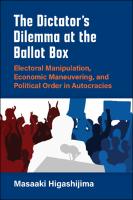The Dictator's Dilemma at the Ballot Box
External Review of Whole Manuscript
Electoral Manipulation, Economic Maneuvering, and Political Order in Autocracies
| dc.contributor.author | Higashijima, Masaaki | |
| dc.date.accessioned | 2022-06-21T09:23:50Z | |
| dc.date.available | 2022-06-21T09:23:50Z | |
| dc.date.issued | 2022 | |
| dc.identifier | OCN: 1296611071 | |
| dc.identifier.uri | https://library.oapen.org/handle/20.500.12657/57062 | |
| dc.description.abstract | Contrary to our stereotypical views, dictators often introduce elections in which they refrain from employing blatant electoral fraud. Why do electoral reforms happen in autocracies? Do these elections destabilize autocratic rule? The Dictator’s Dilemma at the Ballot Box argues that strong autocrats who can garner popular support become less dependent on coercive electioneering strategies. When autocrats fail to design elections properly, elections backfire in the form of coups, protests, and the opposition’s stunning election victories. The book’s theoretical implications are tested on a battery of cross-national analyses with newly collected data on autocratic elections and in-depth comparative case studies of the two Central Asian republics of Kazakhstan and Kyrgyzstan. | en_US |
| dc.language | English | en_US |
| dc.relation.ispartofseries | Weiser Center for Emerging Democracies | en_US |
| dc.subject.other | election, autocracy, dictatorship, electoral fraud, electoral system, electoral reform, electoral manipulation, economic policy, political business cycles, fiscal policy, coup, protest, opposition, distributive politics, Central Asia, Kazakhstan, Kyrgyzstan, developing country, democratization, regime change, natural resource, oil, state capacity, dominant party, Nursultan Nazarbaev, Askar Akaev | en_US |
| dc.title | The Dictator's Dilemma at the Ballot Box | en_US |
| dc.title.alternative | Electoral Manipulation, Economic Maneuvering, and Political Order in Autocracies | en_US |
| dc.type | book | |
| oapen.identifier.doi | 10.3998/mpub.11978139 | en_US |
| oapen.relation.isPublishedBy | e07ce9b5-7a46-4096-8f0c-bc1920e3d889 | en_US |
| oapen.relation.isFundedBy | b818ba9d-2dd9-4fd7-a364-7f305aef7ee9 | en_US |
| oapen.relation.isbn | 9780472075317 | en_US |
| oapen.relation.isbn | 9780472055319 | en_US |
| oapen.relation.isbn | 9780472220083 | en_US |
| oapen.collection | Knowledge Unlatched (KU) | en_US |
| oapen.pages | 366 | en_US |
| peerreview.anonymity | Double-anonymised | |
| peerreview.id | d98bf225-990a-4ac4-acf4-fd7bf0dfb00c | |
| peerreview.open.review | No | |
| peerreview.publish.responsibility | Scientific or Editorial Board | |
| peerreview.review.decision | Yes | |
| peerreview.review.stage | Pre-publication | |
| peerreview.review.type | Full text | |
| peerreview.reviewer.type | External peer reviewer | |
| peerreview.title | External Review of Whole Manuscript | |
| oapen.review.comments | The proposal was selected by the acquisitions editor who invited a full manuscript. The full manuscript was reviewed by two external readers using a double-blind process. Based on the acquisitions editor recommendation, the external reviews, and their own analysis, the Executive Committee (Editorial Board) of U-M Press approved the project for publication. |

